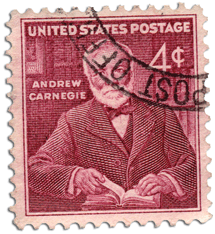 |
the carnegie chronicles
by David Brown
Find out more about the Free Will Baptist Foundation at www.fwbgifts.org.
|
Andrew Carnegie was born November 25, 1835, in Dunfermline, Scotland. He and his family immigrated to the United States in 1848 when Andrew was 13 years old. His father Will was a weaver, and he settled in Allegheny, Pennsylvania, where he produced and sold his own cloth. Young Andrew began to work as a bobbin boy, changing spools of thread in a cotton mill 12 hours a day, six days a week, making $2 a week.
Three years later, at age 16, he became a telegraph messenger boy for the Pittsburg office of the Ohio Telegraph Company making $2.25 a week. Before long, he taught himself to transcribe Morse code and 1853, at the age of 18, he was employed by Thomas A, Scott of the Pennsylvania Railroad Company as a secretary/telegraph operator at a salary of $4.00 a week.
With Scott’s help, Andrew moved up rapidly with the railroad and became the superintendant of the Pittsburg Division. Scott also helped him manage his first investments. He successfully invested $600 in a company called Adams Express, invested in sleeper cars for the Pennsylvania Railroad Company, and bought part of a company that made wagons. He began to invest and reinvest in railroad related industries such as refining iron, bridge building, and rail making. Over time, Carnegie began to accumulate wealth.
He continued to work for the railroad and eventually became the superintendent of the Western Division. In 1861, with Civil War looming, his friend Thomas Scott was appointed assistant Secretary of War. He turned to Carnegie to be the Superintendant of the Military railroads. His efforts were instrumental in the success of the Union Army. Carnegie continued to invest during the war, including a $40,000 investment in Storey Farm that yielded dividends of over $1 million the first year.

In the years following the war, he established several iron refiners such as Keystone Bridge Works and Union Ironworks in the Pittsburg area. In 1873, Carnegie met Henry Bessemer on a trip to Great Britain. Bessemer had recently invented a new process of making steel, and Carnegie became convinced that the future of industry was in steel. When he returned from his trip he immediately established his first steel mill near Pittsburg.
Carnegie Steel became the largest producer of pig iron, steel rails, and iron coke in the world. Carnegie Steel began to buy smaller operations and grew exponentially. In 1901, at age 66, Carnegie began to consider retirement. J P Morgan approached Carnegie about buying Carnegie Steel. He wanted to consolidate Carnegie Steel with other major producers to form one company. Carnegie agreed and accepted Morgan’s bid of $480 million (Carnegie himself received over $225 million), and Carnegie Steel became the centerpiece for J.P. Morgan’s steel corporation. The company, which Morgan named U.S. Steel, became the first corporation in the world with a market value of over $1 billion, equal to 4% of the value of the United States.
Andrew Carnegie headed into retirement with a net worth of $380 million. But this is not just another American “rags to riches” story. For during his retirement—the last 18 years of his life—Andrew Carnegie gave away more than 90% of his vast fortune.
Carnegie loved to read, and he credited his reading with his success as an investor. Therefore it is not surprising that he funded more than 3,000 libraries in 47 states. He established Carnegie Technical Institute in Pittsburg, known today as Carnegie-Mellon University. He was a large benefactor to Tuskegee Institute and established large pension funds for his former employees.
In 1905, he established a pension fund for American college professors, an organization known today as TIAA-CREF. He funded the construction of 7,000 church organs and built Carnegie Hall in New York City. Carnegie gave away $350 million (equal to $4.3 billion today) and when he died in 1919, the remaining $30 million of his fortune was given away to foundations, charities and pensioners. His giving proved to be far more remarkable than his ability to make money.
Luke 12 tells the “Parable of the Rich Fool,” a man who looked at his wealth and said, “I have plenty; I can take it easy, eat, drink, and be merry.” Even though he was not a large contributor to the Lord’s work, I think Carnegie understood something about wealth the Rich Fool did not.
What if the Rich Fool had invested his substantial wealth to expand his operation? Would his actions have been acceptable to Jesus? What if he bought more land to expand his grain operation or planted a vineyard to diversify his investments? What if he continued to tithe faithfully? Would his investments have been acceptable to God? I think so.
Scripture makes it clear that the Lord often blesses those who use their wealth to expand the Kingdom of God. The “Parable of the Talents” in Matthew 25 makes it clear that investing for the sake of God’s work is acceptable in His eyes. Those servants who invested their talents or money wisely were rewarded while the servant who buried his funds was punished.
My Aunt died last year. She had very little when she died, yet she spent her life giving to others from her abundance. She shared the vegetables she produced in her very large garden. She always shared her abundant crop with family, friends, and neighbors, but she would also load her truck and “peddle” her abundance into the poor areas near her home. Technically, she “charged” for the vegetables, recording her “sales” in a little book and telling her “customers” to pay her when they could. She never collected. She never intended to. In effect, they were gifts.
What if the Rich Fool had given his increase directly to the Lord’s work? He had opportunity. According to scholars, the Temple accepted both cash and noncash gifts. They accepted gifts of grain and animals—any noncash gifts that could be stored for management or distribution. The system was the ancient equivalent of the modern day Foundation, deciding which assets would be sold to support the priests and which would be retained to produce income.
Any time the Lord has blessed us with abundance, we should give back generously to his work. This is true regardless of where you fall on the economic scale. The truth is, Americans have far more than the average world citizen. The sidebar to the [left, right, above, below] clearly illustrates that if the world is to be reached for Christ, the financial resources will primarily come from the United States.
The Rich Fool did not do any of these “what ifs.” Instead he was greedy. He held tightly to everything he had acquired, funding his pursuit of pleasure. Some think only the rich have a problem with greed. My observation is that this weakness affects all economic strata. Some of the greediest people I know are middle class or lower while some of the most generous people I have met are wealthy.
The third chapter of Colossians and the fifth chapter of Ephesians equate greed with idolatry. And the word used for greed in these passages is synonymous with covetousness. The Ten Commandments specifically prohibit idolatry (against God) and covetousness (against man). In other words, greed violates two of the Ten Commandments—that’s trouble, serious trouble.
It is possible to be greedy without money, and many go into debt to feed this monster. Many who desire to be generous cannot give because of foolish debts. Even Christians are affected by advertising that tries to convince readers and viewers to buy things they don’t need. How much is enough? Even those who have money need to exercise restraint. Just because you can afford it does not mean you need it!
Today, several wealthy individuals give generously. Bill Gates, founder of Microsoft, has already given $29 billion (a third of his net worth) to the foundation established in his name. Warren Buffet has given $37 billion to five different foundations including the Bill and Melinda Gates Foundation. He plans to give away most of his fortune before he dies. Unfortunately the Gates Foundation is a prominent supporter of Planned Parenthood, the leading proponent of abortion.
While I wish Andrew Carnegie had done more for the Lord’s work, at least I am not opposed to the causes he supported. Yet the generosity of Bill Gates, Warren Buffet, and Andrew Carnegie should make us stop and consider our priorities. How much more should we as servants of the Lord be generous with our current and estate gifts to the Kingdom! May we learn the importance of generous giving from the examples of these wealthy men, and avoid the greed of the Rich Fool.
About the Writer: David Brown is the director of the Free Will Baptist Foundation. The Foundation exists to help donors give effectively. To learn more, visit the website: www.fwbgifts.org or call (877) 336-7575.
|

